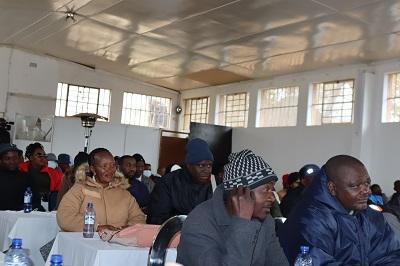Africa-Press – Lesotho. Up to 300 farmers are set to receive grants.
The Government of Lesotho, through the Smallholder Agriculture Development Project (SADP), with funding from the World Bank, the International Fund for Agricultural Development (IFAD), and the Government of Japan, has officially launched the implementation phase of its third round of grants for selected beneficiaries.
This new phase, referred to as SADP II, aims to provide grants to a total of 300 farmers and will run for three years.
The project seeks to help SMEs scale up their agricultural operations through the introduction of modern technologies and improved business practices, as well as to curb unemployment in Lesotho.
Thabo Matsepe, Chairperson of the Matching Grant Office at SADP, in his remarks during the SADP II cohort workshop Pitseng, said that these grants are non-repayable funds provided by government departments, development agencies, or private foundations to support specific agricultural activities.
“These may include land preparation, purchasing seeds or livestock, investing in infrastructure, or adopting new technologies,” said Matsepe.
“Through these grants, we aim to ensure that farmers are not only producing more but are also better equipped to deal with the impacts of climate change,” he said.
“We are focusing on introducing climate-smart techniques and connecting farmers to value chains that can sustain their businesses beyond the grant period.”
However, Matsepe noted that like many projects, SADP has faced a couple of challenges.
“We might be here hosting this workshop to capacitate these farmers, but most of them might not meet the required standards,” said Matsepe, stating that most farmers make certain claims during the application only to find out that they do not have the things mentioned, making most of them fail.
Touching on youth unemployment and their lack of participation in the SADP project, Matsepe highlighted that the main obstacle standing between the youth and the project is land. “Most of the youth do not have land to work on, and parents are not forthcoming when it comes to even giving them a sub-lease.”
He said that SADP is working on ensuring that there are certain policies within the project that cater to the youth as well.
The grants are awarded on a competitive basis, encouraging sustainable farming and commitment among applicants. Selected beneficiaries are expected to utilise the funds to grow their agricultural businesses, invest in infrastructure, adopt environmentally friendly technologies, and meet the required number of employees by the project.
On behalf of farmers who have benefited from SADP, Tlhapi Farm Products PTY (LTD) said being part of the project has really helped his business grow. “When I started farming, I had only pigs and three cows. Then I met SADP in 2021, and that is when I started seeing major change in the company.”
“I was able to buy bigger land to run my farm and build proper housing for them, and now I own 15 cows.”
He explained that reaching the stage he is at came with its own challenges, including not knowing how to file taxes on time, losing his livestock at the border gate, and being scammed.
He urged the new SADP participants not only to trust in themselves that they can succeed and grow their businesses, but also to be on the lookout for scammers, noting that due to the high unemployment rate, the number of scammers has risen.
For More News And Analysis About Lesotho Follow Africa-Press






